Related Research Articles

Hideto Matsumoto, known professionally as hide, was a Japanese musician, singer, songwriter, and record producer. He achieved international fame as the lead guitarist of the rock band X Japan from 1987 to 1997 and a solo artist from 1993 onward. He also formed the United States-based rock supergroup Zilch in 1996.

Blue Blood is the second studio album by Japanese rock band X Japan, then known as simply X. It was released on April 21, 1989, by CBS/Sony as the band's major label debut. Blue Blood sold more than 700,000 copies, reached number 6 on the Oricon chart and stayed on the chart for more than 100 weeks. The album's singles would also reach the top five on the chart. In 2007, Rolling Stone Japan ranked Blue Blood number 15 on their list of the "100 Greatest Japanese Rock Albums of All Time".

"Tears" is the ninth single by the Japanese rock band X Japan, released on November 10, 1993.
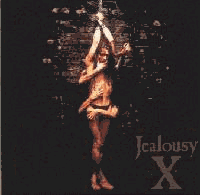
Jealousy is the third studio album by Japanese heavy metal band X Japan, then known as simply X. The album was released on July 1, 1991, by Sony, as the band's second major label release. Jealousy is the band's best-selling album, having sold more than one million copies, it topped the Oricon chart and stayed on the chart for 50 weeks. The album's singles would also reach the top three on the chart. It is their last album under the name "X", before changing to "X Japan", and the last to feature Taiji on bass, who would be replaced by Heath.

"Say Anything" is a single released by X Japan on December 1, 1991.

"Pink Spider" is the ninth single by Japanese musician hide, the second to bear the hide with Spread Beaver name, released on May 13, 1998, eleven days after his death. It debuted at number 1 on the Oricon Singles Chart and was the 11th best-selling single of the year, being certified Million by the RIAJ. It was also named "Song of the Year" at the 13th Japan Gold Disc Awards.
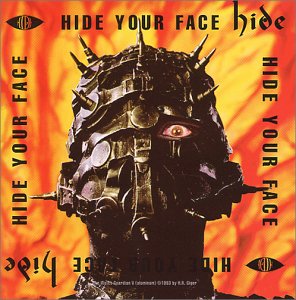
Hide Your Face is the debut album by Japanese musician hide, released on February 23, 1994. It reached number 1 on the Oricon Albums Chart and was certified Double Platinum by the RIAJ for sales over 500,000 copies. It was named one of the top albums from 1989-1998 in a 2004 issue of the music magazine Band Yarouze.
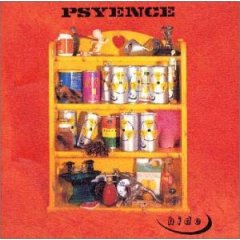
Psyence is the second album by Japanese musician hide, released on September 2, 1996. It topped the Oricon Albums Chart and was certified double platinum by the RIAJ for sales over 500,000 copies. The album was re-released on the Japan only format SHM-CD on December 3, 2008.
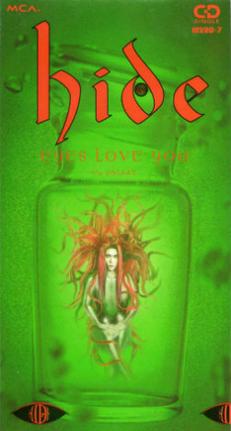
"Eyes Love You" is the debut single by Japanese musician hide, released on August 5, 1993. It reached number 3 on the Oricon chart. His second single "50% & 50%" was released on the same day. Both singles' covers are identical except; "Eyes Love You" is green, whereas "50% & 50%" is red. They form a 3D picture when they are placed side by side. It was certified gold upon release by RIAJ.
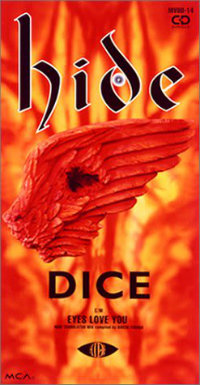
"Dice" is the third single by Japanese musician hide, released on January 21, 1994. It reached number 6 on the Oricon chart. The B-side is a remix of his previous single "Eyes Love You". The single was certified Gold by the RIAJ in February 1994, and Platinum in February 2020 for sales over 250,000.
"Tell Me" is the fourth single by Japanese musician hide, released on March 24, 1994. It reached number 4 on the Oricon Singles Chart. The B-side "Scanner " is a different version of "Scanner" from Hide Your Face, as it features vocals by Ryuichi from Luna Sea. The single was certified Gold by the RIAJ in April 1994, and Double Platinum in February 2020 for sales over 500,000.
"Beauty & Stupid" is the sixth single by Japanese musician hide, released on August 12, 1996. It reached number 4 on the Oricon chart. It was certified gold by RIAJ in December 1998. On May 2, 2007, the single was re-released with a slightly different cover. On August 4, 2010, it was re-released again as part of the second releases in "The Devolution Project", which was a release of hide's original eleven singles on picture disc vinyl.
"Hi-Ho"/"Good Bye" is the seventh and only double A-side single by Japanese musician hide, released on December 18, 1996. It reached number 8 on the Oricon chart.

"Rocket Dive" is the eighth single by Japanese musician hide, the first to bear the hide with Spread Beaver name, released on January 28, 1998. It reached number 4 on the Oricon Singles Chart and was the 33rd best-selling single of the year. It has been certified double platinum by the RIAJ for sales over 500,000 copies.
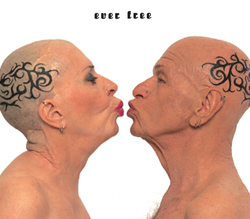
"Ever Free" is the tenth single by Japanese musician hide, the third to bear the hide with Spread Beaver name, released on May 27, 1998. It debuted at number one on the Oricon chart, replacing his previous single "Pink Spider", and was the 23rd best-selling single of the year and certified double platinum by the RIAJ.

"Hurry Go Round" is the eleventh single by the Japanese musician hide, the fourth to bear the hide with Spread Beaver name, released on October 21, 1998. The song was left incomplete at the time of hide's death on May 2, 1998, being finished by his Spread Beaver band mates and included on the album Ja, Zoo. It reached number 2 on the Oricon Singles Chart and has been certified double platinum by the RIAJ for sales over 500,000.
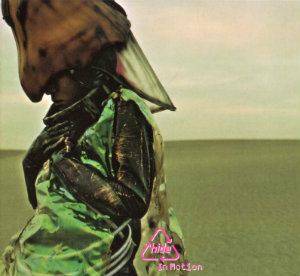
"In Motion" is a song by Japanese musician hide released as a single on July 10, 2002. Notable for being released four years after his death, it reached number 4 on the Oricon Singles Chart. It was certified gold by the RIAJ in February 2020 for sales over 100,000.

Tribute Spirits is a tribute album released on May 1, 1999, in memory of Japanese rock musician hide. It collects cover versions of his songs by various artists, among them most members of hide's former band X Japan.

"50% & 50%" is the second single by Japanese musician hide, released on August 5, 1993. It reached number 6 on the Oricon chart. His first single "Eyes Love You" was released on the same day. Both singles' covers are identical except; "50% & 50%" is red, whereas "Eyes Love You" is green. They form a 3D picture when they are placed side by side. It was certified gold upon release by RIAJ.
The following is the discography of hide, a Japanese rock musician who first gained fame in the late 1980s as lead guitarist of the heavy metal band X Japan before starting his solo career in 1993. Prior to X Japan, hide was leader and guitarist of the heavy metal band Saber Tiger, who released one self-titled EP in July 1985 and contributed to two omnibuses before ending activities. Although two compilation albums of demos and live recordings and one concert VHS would later be released in 2001, with the band credited as Yokosuka Saver Tiger.
References
- ↑ "hideのシングル売り上げランキング" (in Japanese). oricon.co.jp. Retrieved 2012-07-08.
- ↑ "月次認定作品 認定年月:1996年 7月" (in Japanese). RIAJ. Retrieved 2018-02-18.
- ↑ "hideの8cmシングル12cm化シリーズ第3弾、ついにリリース!". barks.jp (in Japanese). Retrieved 2011-06-26.
- ↑ "hide singles on vinyl". tokyohive.com. Retrieved 2011-06-26.
- ↑ "Misery" liner notes, 1996-06-24. Retrieved 2018-01-27
- ↑ "hide TRIBUTE SPIRITS". amazon.co.jp (in Japanese). Retrieved 2012-06-10.
- ↑ "hide Memorial Summit Day 1 - Part A". jame-world.com. Retrieved 2012-06-10.
- ↑ "hide Memorial Summit Day 1 - Part B". jame-world.com. Retrieved 2012-06-10.
- ↑ "Two hide Tribute Albums to be Released Simultaneously!". musicjapanplus.jp. Retrieved 2013-05-05.
- ↑ "hide Tribute VI -Female SPIRITS-". cdjapan.jp. Retrieved 2013-12-15.
- ↑ "hide Tribute VII -Rock SPIRITS-". cdjapan.jp. Retrieved 2013-12-15.